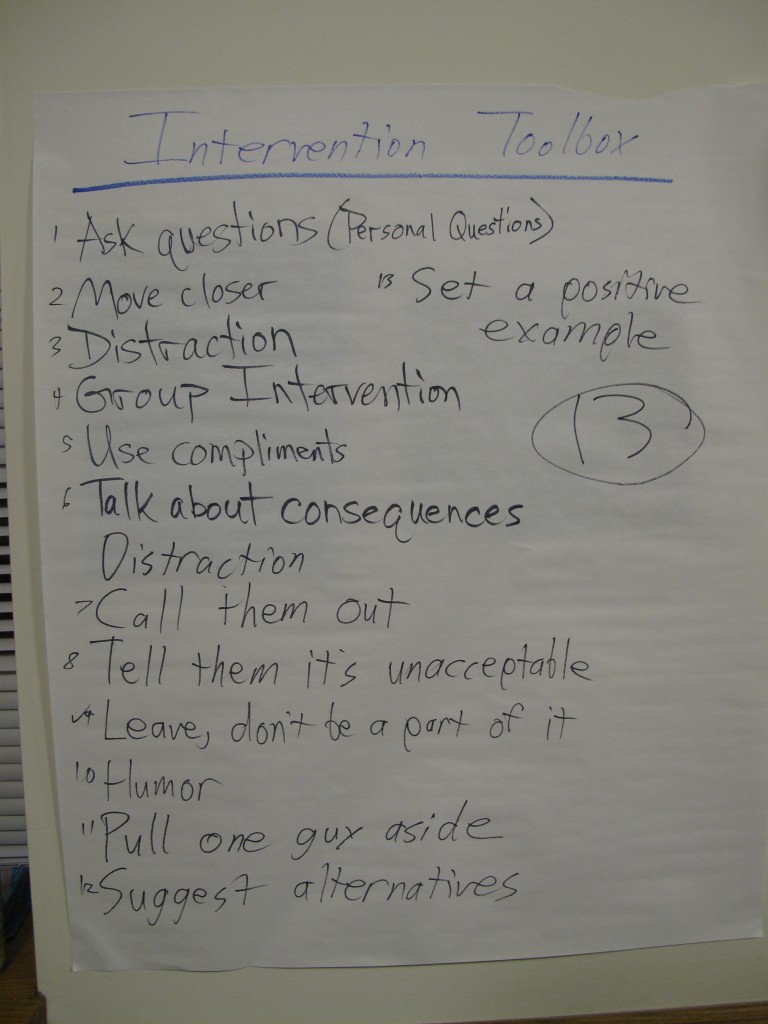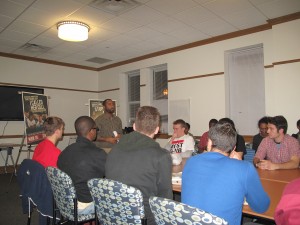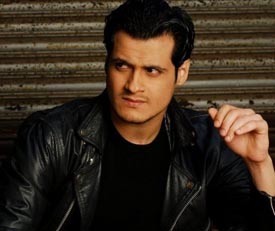Editor’s Note: Bix Gabriel and Joe Samalin are part of the NYC team that created the new video “Shit Men Say to Men who Say Shit to Women on the Street” that’s been viewed nearly 50,000 times in less than one day and was made for International Anti-Street Harassment Week.
When it’s cold, my nose turns purple. I’m self-conscious about it. To hide the offending nose, and because I was indeed cold, I wrapped half my face in a scarf as I stood in a park recently.
A man walking towards me said, “Hey, girl. You pretty under that scarf?” I stared at him for a nanosecond, then looked away. He kept at me.
“Show me your face.”
“You pretty?”
“C’mon, look at me.”
My eyes stayed down, my ears pretended deafness. He passed me and I remained still. Then I breathed. And then it came: “Yeah, thought so. You ugly.”
The irony: At that instant, my partner Joe and other guys were 50 feet away, filming the video “Shit Men Say To Men Who Say Shit to Women on the Street”. They were saying things on-camera that I wanted someone to say in life. Right then. To that guy. They were things I could have said. But I didn’t. I hate admitting it but I was afraid. And I felt helpless. And the more I think about it, the madder I get. Because this is not my job. It’s not my job to be on guard every second; to defend myself constantly; to fight against every male gaze on me, wherever I am, whatever I wear.
Whose job is it? I understand that ending street harassment is everyone’s problem. But committing it is not everyone’s choice. So I can’t accept this equation, where some men choosing to harass = unsafe streets for all women. This is why men who don’t harass have the job and the obligation – not to protect women (we can take care of ourselves; we have loads of practice) but to hold all men accountable….
When I hear stories like the one my partner Bix shared above, I am left feeling this pain and nausea in my gut, a shitty and sad feeling I carry with me. This feeling is a gift that I struggle to hold on to and fight tooth and nail to keep present in my mind and heart. Because otherwise I will forget, I will lose it, and it will become again that much harder for me as a straight, white, heterosexual and cisgendered guy steeped in privilege to keep the struggle necessary and constant, alive and vital. That is how privilege works – it is its very nature.
I have worked to prevent violence against women for years. And yet while collaborating to create this video, I have been seeing the violence men commit against women with fresh eyes. Being 50 feet away from Bix as it happened to her brought home to me how pervasive street harassment is, and how unaware of it we as men can be.
And yet this video came about the way it did because today men – straight, gay, young, old, of all races – are asking what we can do to change things. But knowing the right words means nothing without the recognition of the violence all around us and the will to challenge and stop it consistently. Not – as Bix said – to protect women, but to hold ourselves and other men accountable for our violence and our silence. That is our responsibility.
I still fail way more often than I succeed. But the times I fail and get back up and try again (which isn’t always the case and isn’t always easy to do) that is the real work. This is what we as men NEED to do in order to be true allies to the women and girls around us, whether we know them or not.




 2. “Irrespective to what your ‘friends’ think always question your own double standards and attitudes. Avoid laughing at sexist jokes simply to humor them reminding yourself you might offend someone. Do not repeat what your fathers did. Believe me there is no place in the Men’s community for perverts.Your attitude towards strangers reflects your upbringing at home. Besides you wouldn’t want your mother or your sister to go through the exact same thing.”
2. “Irrespective to what your ‘friends’ think always question your own double standards and attitudes. Avoid laughing at sexist jokes simply to humor them reminding yourself you might offend someone. Do not repeat what your fathers did. Believe me there is no place in the Men’s community for perverts.Your attitude towards strangers reflects your upbringing at home. Besides you wouldn’t want your mother or your sister to go through the exact same thing.” 